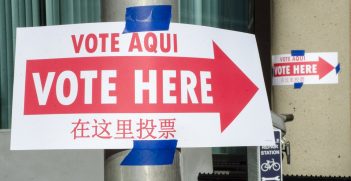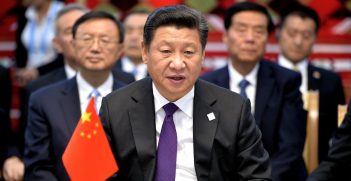Same-sex Marriage in Taiwan: Democratic Institutions Override Popular Conservativism, but Whither Marriage Equality?

Taiwan legalises same-sex marriage but compromises on marriage equality.
Same-sex marriage will become legal in Taiwan on 24 May 2019 – a historic first in Asia.
On 17 May, Taiwan’s Legislative Yuan (parliament) voted in majority to pass The Enforcement Act of the Judicial Yuan Interpretation No. 748. The legislation gives same-sex couples the right to marry and property protections under civil law. It states that “two people of the same gender may establish a permanent relationship of intimacy and exclusivity for the purpose of managing a common life”.
But in a concession to conservative critics, the legislation stops short of full marriage equality. Spouses in same-sex marriages can only adopt the biological children of their partners, whereas spouses in opposite-sex marriages can adopt non-biological children. Same-sex marriages involving a partner from overseas are also only permitted when the foreign partner comes from a country where same sex marriage is legal.
The compromise has its origin in the results of five local election referendums held in November 2018. The referendum responses indicated that 72.5 percent of voters believed that marriage defined in the Civil Code should remain restricted to a union between a woman and a man. However, 61 percent of the referendum respondents also believed that same-sex couples should have the right to cohabit on a permanent basis. Only 34 percent of referendum respondents agreed that the national curriculum should educate youth about gender equality, safer sex and sexual orientation, suggesting opposition to LGBTQ-inclusive education.
These results were associated with intense “pro-family” protests on the part of Christian groups. Although Christians account for just over 7 percent of Taiwan’s population, their protests and arguments attracted widespread publicity. Opponents of same-sex marriage argued that legalisation would undermine traditional Chinese family values, which emphasize heterosexual marriage for the purposes of reproduction. They further maintained that legalisation would encourage youth homosexuality and promiscuity, contribute to the spread of AIDS and undermine social morality.
However, on 29 November 2018, the Secretary-General of the Judicial Yuan stated that the referendum results could not overturn a 24 May 2017 Constitutional Court ruling. The court ruled that preventing same-sex couples from marrying was unconstitutional because it violated citizen rights to equality. It instructed the parliament to amend or enact laws within two years or the legislation would change by default.
The passing of legislation in May 2019, one week before the court deadline, was the culmination of two years of political party backsliding and infighting on marriage equality.
The Democratic Progressive Party (DPP), which ended a half-century of Nationalist Party rule when it first formed government in 2000, has developed a strong political identity as a party committed to realizing an economically prosperous, cosmopolitan, liberal, and independent Taiwan. As such, the DPP has supported lobbying on marriage equality by domestic gender and LGBTQ organizations, although not systematically.
In October 2015, a year before Tsai Ing-wen’s election as Taiwan’s first female President, she expressed support for marriage equality in a video posted on Facebook around the time of the country’s annual gay pride march. The first march was held in 2003. Tsai declared: “I support marriage equality. Everyone has the right to pursue their own love and happiness”. On 16 May 2019, when the same-sex marriage legislation was debated, she tweeted: “Good morning #Taiwan. Today, we have a chance to make history & show the world that progressive values can take root in an East Asian society. Today, we can show the world that #LoveWins”.
But these ambitions were brought to heel by political realities. Having experienced defeats in local 2018 elections, the DPP embraced consensus-building in the run-up to the January 2020 Taiwan elections, all but ensuring that the same-sex marriage legislation would confirm the status quo, rather than responding to LGBTQ demands for marriage equality.
These demands were long in the making. Activist Chi Chia-wei first petitioned the Constitutional Court to rule on same-sex marriage in 2001, and then in 2015 he requested a ruling on Article 972 of the Civil Code — which states that a marriage is between a man and woman. The Taipei City government also filed a request in 2015, after three same-sex couples lodged an administrative lawsuit against the government when their marriage registrations were rejected.
A series of proposals supporting marriage equality were brought before the Taiwan parliament between 2003 and 2017. In 2012, the Taiwan Alliance to Promote Civil Partnership Rights recommended amending the Civil Code to make the sections on marriage and family gender-neutral, and include new provisions for civil partnerships and multiple-person families. In 2013, DPP members also proposed making the Civil Code chapter on marriage gender-neutral, thereby institutionalizing marriage equality and gay adoption.
By 2016, all of Taiwan’s major political parties had publicized bills on same-sex marriage, although they disagreed on the extent same-sex and opposite-sex marriage should be treated as equivalent in law.
Prior to the 2017 Constitutional Court ruling, city governments anticipated legal changes and introduced a registration system for same-sex partnerships — aimed at respecting gender equality and human rights. In March 2015, Kaohsiung city became the first Taiwanese city government to allow same-sex couples to register their partnership through household registration. A year later, all of Taiwan’s city governments had followed suit; approximately 75 percent of the population live in these jurisdictions. Around 4,000 same-sex couples had registered partnerships by late 2018.
The passing of same-sex marriage legislation in Taiwan is a landmark decision whose effects will reverberate around the region for many years to come. Yet the national debate on this issue has only reached the current stage through a long, and at times bitter, process of democratic contestation. Cross-party debate on whether opposite-sex and same-sex marriages should be differentiated in law, and whether same-sex couples should be given the right to adopt, stalled the legislation.
Same-sex couples in Taiwan can now marry with civil law protections. But achieving marriage equality will require court appeals against the current legislation’s inherent discrimination, and positive agenda-setting on equal rights for family units. This means that, for LGBTQ activists in Taiwan, the battle for genuine marriage equality is still far from being won.
Dr Elaine Jeffreys is professor in International Studies at the University of Technology Sydney.
Dr Pan Wang is senior lecturer in Asian and Chinese Studies at the University of New South Wales.
This article is published under a Creative Commons Licence and may be republished with attribution.





